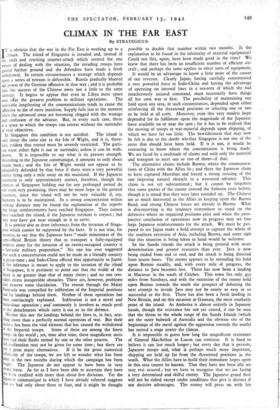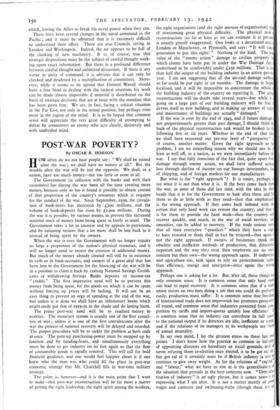CLIMAX IN THE FAR EAST
By STRATEGICUS
T is obvious that the war in the Far East is working up to a I climax. The island of Singapore is invaded and, instead of the swift and crushing counter-attack which seemed the one means of dealing with the situation, the invading troops have gained further ground and the defenders have made a fresh withdrawal. In certain circumstances a strategy which depends upon a series of retreats is defensible. Russia gradually blunted the power of the German offensive in that way ; and it is probable that the success of the Chinese owes not a little to the same strategy. It begins to appear that even in Libya mere space may offer the greatest problem to military operations. The inevitable lengthening of the communications tends to cause the offensive to die of mere inanition. Supply fails just at the moment when the advanced areas are becoming clogged with the wastage and confusion of the advance. But, in every such case, there is a space to which the troops can retreat without the surrender of vital objectives.
In Singapore this condition is not satisfied. The island is only about the same size as the Isle of Wight, and it is, there- fore, evident that retreat must be severely restricted. The garri- son must either fight it out or surrender, unless it can be with-
drawn. It is impossible to say what is its present strength. According to the Japanese communiqué, it amounts to only about 2o,000 men ; and the Isle of Wight would not appear to be adequately defended by that force if there were a very powerful enemy lying only a mile away on the mainland. If the Japanese statement is only approximately correct, therefore, though the chances of Singapore holding out for any prolonged period do rot seem very promising, there may be more hope in the general situation, since the island will not be very valuable if, say, Sumatra is to be maintained. In a strong concentration within striking distance may be found the explanation of the reports that large reinforcements have reached Singapore. They cannot have reached the island, if the Japanese estimate is correct ; but they may have got near enough to it to serve.
It is unwise also to draw inferences from the invasion of Singa- pore which cannot be supported by the facts. It is not true, for instance, to say that the Japanese have " made mincemeat of the semi-official British theory that to transport a fully-equipped modern army for the invasion of an enemy-occupied country is a fantastic military proposition." No one has ever suggested that such a concentration could not be made in a friendly country in peace-time ; and Indo-China offered that opportunity to Japan. If the inference is meant to apply to the invasion of the island of Singapore, it is pertinent to point out that the width of the Strait is no greater than that of many rivers ; and no one con- siders rivers insuperable obstacles. There are, however, problems that deserve some elucidation. The retreat through the Malay Peninsula was compelled by infiltration of the Imperial positions and by landings behind them. Neither of these operations has been convincingly explained. Infiltration is not a novel and miraculous operation ; and" commonlyit involves as much peril to the detachments which carry it out as to the defence.
Neither this nor the landings behind the lines is, in fact, any- thing more than a perfectly normal operation of war. But their success has been the vital element that has caused the withdrawal of the Imperial troops. Some of these are among the finest Loop: in the world ; yet, time after time, these magnificent units 'nave had their flanks turned by one or the other process. The fall explanation may not be given for some time ; but there are
not a great many alternatives. If it be the gross numerical inferiority of the troops, we are left to wonder what has been done in the two months during which the campaign has been fought. The Japanese do not appear to have been in very strong force. As far as I have been able to ascertain they have not been credited with more than about five divisions. Yet the Japanese communiqué to which I have already referred suggests that we had only about three or four, and it might be thought
possible to double that number within two months. Is the explanation to be found in the inferiority of material equipment? Could not this, again, have been made good in the time? We know that there has been an insufficient number of efficient air- craft ; and perhaps the same applies to other sorts of equipment.
It would be an advantage to know a little more of the causes of our reverses. Clearly Japan, having carefully concentrated a very powerful force in Indo-China and having the advantage of operating on internal lines in a sea-area of which she had treacherously secured command, must necessarily have things all her own way at first. The possibility of maintaining our hold upon any area, in such circumstances, depended upon either reinforcing all the threatened positions or selecting one or two to be held at all costs. Moreover, even this very modest hope depended for its fulfilment upon the magnitude of the Japanese force available on or near the spot ; for it has to be realised that the moving of troops or war-material depends upon shipping, of which we have far too little. The bewilderment that may now be felt is due to the doubt whether Singapore is not one of the areas that should have been held. If it is not, it would be reassuring to know where the concentration is being made. We are faced by a multitude of claims and with only the material and transport to meet one or two of them—if that.
The alternative claims include Burma, where the communica- tions of China with the Allies lie ; and there the Japanese claim to have captured Martaban and forced a strong crossing of the one imposing natural obstacle to a westward advance. This claim is not yet substantiated ; but it cannot be forgotten that some parties of the enemy crossed the Salween river before, though it is stated that they were later rounded up. The Chinese are as much interested as the Allies in keeping open the Burma Road, and strong Chinese forces are already in Burma. What is disconcerting is the tendency everywhere to stand on the defensive where no organised positions exist and when the pros- pective conclusion of operations now in progress may set free large Japanese reinforcements for the attack. We must be pre- pared to see Japan make a bold attempt to capture the whole of the southern extension of Asia, including Burma, and some sign that this situation is being taken in hand would be welcome.
In the Sunda islands the attack is being pressed with more determination and greater resources than ever. Java is now being raided from end to end, and the attack is being directed from nearer bases. The enemy appears to be extending his hold upon Borneo steadily, and, with every mile of progress, the distance to Java becomes less. There has now been a landing at Macassar in the south of Celebes. This town lies only 452 miles from Surabaya, and with the extension of the enemy hold upon Borneo towards the south the prospect of defeating the next attempt to invade Java may not be nearly so easy or so successful as the first. There has also been a fresh landing in New Britain, and on this occasion at Gasmata, the most southerly point of the island. As Amboina is almost entirely in Japanese hands, though the resistance has not yet ceased, it can be seen that the threat to the whole range of the Sunda Islands (which are the outer bulwark of Australia and the obvious site of the beginnings of the recoil against the aggression towards the south) has moved a stage nearer the climax.
It is impossible to guess how long the magnificent resistance of General MacArthur in Luzon can continue. It is hard to believe it can last much longer ; but every day that it persists, Japanese troops and, what is perhaps much more important, shipping are held up far from the threatened positions in the south. What the Allies have to build their immediate hopes upon in this area cannot be known. That they have not been idle we may rest assured ; but we have to recognise that we are facing a very determined and skilful enemy. The Japanese grand fleet will not be risked except under conditions that give it distinct if not decisive advantages. The enemy will press on with his
attack, leaving the Allies to break his naval power when they can. There have been several changes in the naval command in the Pacific ; and it must be admitted that it is extremely difficult to understand their effect. There are also Councils sitting in London and Washington. Indeed, the air appears to be full of the clanking of new machinery. It is, of course, true that strategic dispositions must be the subject of careful thought work- ing upon exact information. But there is a profound difference between careful thought and unlimited discussion. If there is any virtue in unity of command, it is obvious that it can only be checked and deadened by a multiplication of committees. More- over, while it seems to be agreed that General Wavell should have a free hand in dealing with the tactical situation, his work can be made almost impossible if material is distributed on the basis of strategic decisions that are at issue with the mandate that has been given him. We are, in fact, facing a critical situation in the Far East, not only in the actual position, but perhaps even more in the region of the mind. It is to be hoped that common sense will appreciate the very great difficulty of attempting to defeat by committees an enemy who acts clearly, decisively and with undivided mind.



























 Previous page
Previous page